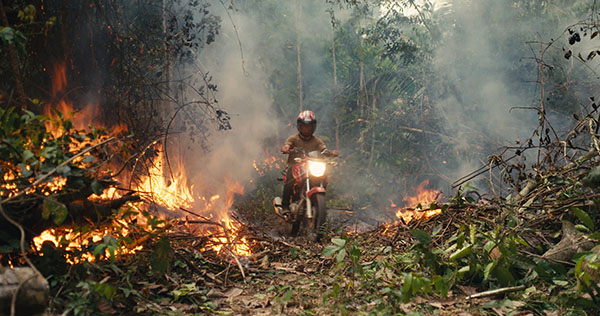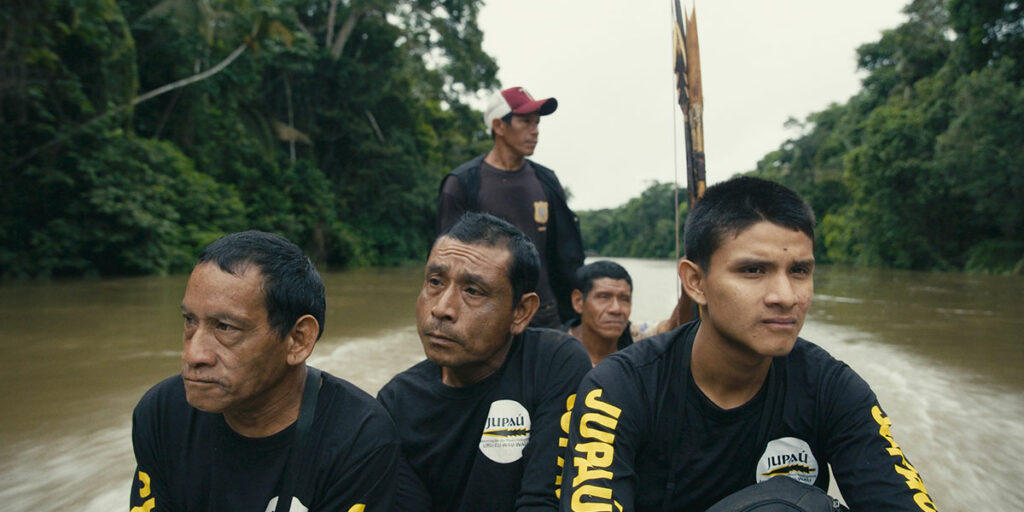National Geographic’s The Territory is a visually stunning documentary about the human costs of climate change, as an Indigenous Brazilian tribe fights for their survival.
Since National Geographic established its documentary film banner in 2017, they have produced and distributed projects that reflect its thought-provoking, nature-related brand. From The Rescue and the Oscar-winning Free Solo (directed by Elizabeth Chai Vasarhelyi and Jimmy Chin) to features including The First Wave and Becoming Cousteau. This January, they picked up two of the most notable documentaries from the Sundance Film Festival. The first was Fire of Love, about the volcanologists Katia and Maurice Krafft. The second is about an Indigenous tribe in the heart of the Amazon rainforest. Directed by Alex Pritz (cinematographer on The First Wave), produced by Darren Aronofsky and made with the cooperation of said tribe, it’s The Territory.
The territory in question lies in the state of Rondônia and belongs to the Uru-Eu-Wau-Wau, who the Brazilian government first contacted in the 1980s. From a population of thousands, around 180 remain. And although they live on protected land, an industrial invasion is taking place. Trucks, tractors and chainsaws are charging through the rainforest to create land for farming and cattle grazing. They have been empowered by Jair Bolsonaro, a populist politician who says “there won’t be once more inch of Indigenous reserve” if he becomes Brazil’s president. When Bolsonaro wins the election, the threat of deforestation starts looming ever closer.
The film follows five main characters. Bitaté is the young leader of the tribe and has the difficult job of protecting their territory from invading settlers. Ari heads the surveillance team. Neidinha is a non-Indigenous environmental activist and close friend (Bitaté calls her his second mother). Sérgio is a farm worker who supports the deforestation of the Amazon, yearning to own a bit of land for himself. And settler Martins has already entered the forest, confident the new president will protect him. With this attack not stopping anytime soon and Indigenous Affairs not intervening, the Uru-Eu-Wau-Wau must fight for their survival.

As the film’s tagline suggests, The Territory is about ‘the battle for home.’ Pritz shot the film over three years, following the Uru-Eu-Wau-Wau tribe as they contended with the invaders destroying the land they – and the rest of the world – are reliant on. As Bitaté says in one interview, “the only thing saving our planet is our rainforest… I believe the Amazon is the heart not just of Brazil, but the whole world.” In this conflict, the stakes are clear. As is the environmental impact: the opening credits show the deforestation that has rapidly expanded over the last 15 years.
However, there are two sides to this debate, and Pritz acts as a mediator between them. On one end, there is the tribe and Neidinha. The latter is fearlessly committed to the cause, willing to do anything to protect the Uru-Eu-Wau-Wau – even if it means risking her safety. On the other end, there are the ‘land thieves.’ Sérgio and Martins believe this land is their God-given right, that the tribe “don’t farm or create anything. They just live here.” Sérgio compares this to an old Western and Manifest Destiny, saying “the Brazilian dream is to own some land, and make your living from it.” That is certainly his dream. But even then, the cautious Sérgio won’t enter the territory until the government formally deems it OK. Both perspectives provide some contextualisation for this issue and produce an intriguing debate over land ownership and what the settlers feel entitled to.
The cinematography credit is shared between Pritz and Tangãi Uru-Eu-Wau-Wau, with additional camerawork from two other tribe members. And The Territory looks amazing. An extreme close-up of ants turns into a quick tracking shot of children running in one swoop. If there is a cut in-between, editor Carlos Rojas Felice has disguised it brilliantly. Furthermore, drone shots are incorporated to show the extent of this deforestation. Then we get to August 2020. COVID-19 has hit Brazil, and the tribe have begun filming with a digital camera gifted by Pritz. As a result, in a movie all about them, the Uru-Eu-Wau-Wau provide some of its footage as they document their mission to catch the invaders. The camerawork symbolises a sense of community in the tribe and the power of cinema in raising awareness of environmental issues. It also helps the footage has an exciting verité style. One particular sequence feels like an impressive thriller, helped by Katya Mihailova’s score and Felice’s tight editing.
The Territory is a visually stunning documentary about the human costs of climate change, seen here through an Indigenous Brazilian tribe and their war against the territory’s invaders. What stands out here is the cooperation between the filmmakers and the tribe, who allow Pritz to tell their story with almost-complete access. Amidst the bleak environmental destruction we see here, there is hope for the future too. Since the documentary’s Sundance premiere, Bolsonaro has been ousted as Brazil’s President. He lost the election to Luiz Inácio Lula da Silva (known simply as Lula), who focused on the rainforest and environmental issues during his campaign. Time will tell if Lula takes action in office. Until then, the most powerful tool the Uru-Eu-Wau-Wau has is their movie camera. As Bitaté beautifully summarises: “It’s important to record because then you have a weapon.”
The Territory will premiere on National Geographic Channel on December 1 and will be available to stream on Disney+ on December 2.

